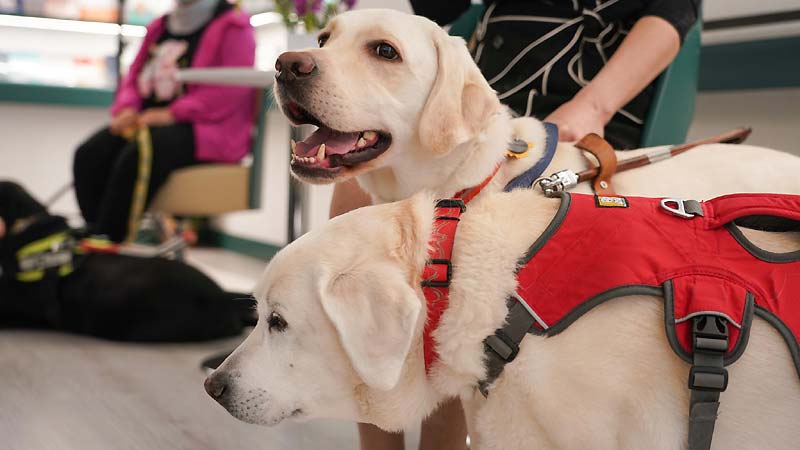- Size
- Smallest
- Small
- Small to Medium
- Medium
- Large
- Giant
- Characteristics
- Smartest
- Hypoallergenic
- Fluffy
- Best Guard
- Best Family
- Best for Kids
- Low Shedding
- Healthiest
- Police Dogs
- Most Calm
- Quietest
- Color
- White
- Black
- Grey
- Brown
- Blue
- Red
- Coat
- Hairless
- Short
- Long
- Origin
- Japan
- China
- Australia
- Germany
- Italy
- United States
- France
- Group
- Hound
- Terrier
- Herding
- Toy
- Working
- Sporting
Breed Guide: Choosing the Best Service Dog Breeds

Service dogs, often revered for their unwavering loyalty and remarkable abilities, come in various breeds, each uniquely suited to fulfill specific roles based on their distinctive traits and temperament. Understanding these breeds and their potential contributions as service dogs illuminates the breadth of assistance they can offer to individuals in need.
The realm of service dogs encompasses an array of functions tailored to address diverse human requirements, from guiding the visually impaired to providing essential alerts during medical emergencies. The classification includes guide dogs, hearing dogs, and medical alert dogs, each serving a pivotal role in enhancing the lives of their human partners.
Traditionally, guide dogs, primarily aiding the visually impaired, necessitate characteristics such as athleticism, trainability, and larger physical stature. This role has been notably championed by two iconic retriever breeds—the Labrador Retriever and the Golden Retriever.
Guide Dogs
1. Labrador Retriever: Revered as the pinnacle of service dog excellence, the Labrador Retriever embodies intelligence, strength, and an unwavering commitment to their human companions. Their innate qualities make them the quintessential guide dogs, navigating the visually impaired with unmatched reliability and trustworthiness.
2. Golden Retriever: Acknowledged as a prized guide dog, the Golden Retriever exudes intelligence and affection, making them ideal companions for the visually impaired. Their trainability and a penchant for bonding deeply with their humans solidify their place as esteemed service dogs.
However, the scope of service dog breeds extends beyond these esteemed retrievers. German Shepherds, renowned for their versatility and exceptional working capabilities, serve in multifaceted roles as search-and-rescue or police dogs but also excel as guide dogs, psychiatric assistance companions, or hearing dogs. Their inherent need for purpose and strong affinity for human companionship position them as exemplary candidates for various service roles.
Search and Rescue Dogs
3. German Shepherds: Known for their consummate work ethic, German Shepherds are not just guardians in search-and-rescue missions or law enforcement; they also serve adeptly as guide dogs, psychiatric assistance companions, or hearing dogs. Their commitment to tasks and affectionate nature make them invaluable service dog candidates.
Beyond the conventional choices, the versatility of service dog breeds expands to include the Standard Poodle and the Cocker Spaniel, among others, showcasing that size is not the sole criterion for service roles.
Hearing Dogs
4. Standard Poodle: Renowned for their intelligence and agility, Standard Poodles excel as hearing dogs, alerting the deaf or hard-of-hearing to specific sounds with their sharp senses and friendly disposition.
5. Cocker Spaniel: Despite their smaller stature, Cocker Spaniels demonstrate exceptional trainability and affability, rendering them suitable for roles as hearing assistance dogs. However, their grooming needs require dedicated attention from their owners.
The consideration of breeds like Boxers, Dalmatians, Border Collies, and even mixed breeds in service roles emphasizes that breed stereotypes alone do not define a dog's potential. These breeds, with their distinctive traits, offer a spectrum of skills, provided they receive appropriate training and guidance.
Other
6. Boxer: While Boxers exhibit enthusiasm and unwavering devotion, their larger size and playful nature might influence their suitability for focused service roles.
7. Dalmatian: Known for their spirited nature, Dalmatians, with the right training and temperament, can potentially serve as guide dogs. However, their outgoing demeanor might pose challenges in remaining focused on tasks.
8. Border Collie: Revered for their intelligence and herding instincts, Border Collies possess the potential for service roles. However, their high energy levels and inherent herding tendencies necessitate specialized handling to harness their skills effectively.
The remarkable versatility of service dogs extends beyond breed distinctions. Organizations dedicated to training hearing or psychiatric assistance dogs often identify trainable candidates from shelters, emphasizing that individual traits and temperament supersede breed predispositions.
Service dogs, especially guide dogs, are traditionally associated with breeds characterized by intelligence, amiability, and trainability. However, the role extends beyond breed stereotypes, emphasizing the importance of selecting a dog based on their individual qualities and temperament.
Choosing a service dog involves meticulous research and selection from reputable organizations, emphasizing the significance of compatibility between the dog and their intended human partner. Importantly, the Americans with Disabilities Act (ADA) doesn't mandate certification or registration for service dogs, necessitating caution against fraudulent claims of certificates or registrations.
In conclusion, the realm of service dog breeds encompasses a diverse array of talents, emphasizing the significance of recognizing each dog's unique capabilities and characteristics. These exceptional companions transcend breed stereotypes, showcasing their unwavering dedication and transforming lives through their indispensable service and companionship.
You May Also Like
 Dog Training Tips5 Things to Know About Puppy Behavior Training Mistakes
Dog Training Tips5 Things to Know About Puppy Behavior Training Mistakes Dog BehaviorHow Can Dogs Tell If Someone Is Good Or Bad
Dog BehaviorHow Can Dogs Tell If Someone Is Good Or Bad Breed ComparisonBelgian Malinois vs. German Shepherd: Which Is Better?
Breed ComparisonBelgian Malinois vs. German Shepherd: Which Is Better? Breed Reviews10 Most Common Black Dog Breeds
Breed Reviews10 Most Common Black Dog Breeds Breed Reviews12 Best Dogs to Bring to Work
Breed Reviews12 Best Dogs to Bring to Work Breed ComparisonThe Labrador vs. Golden Retriever Debate: Who's Really Smarter?
Breed ComparisonThe Labrador vs. Golden Retriever Debate: Who's Really Smarter?